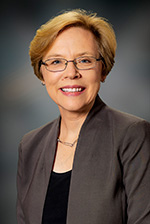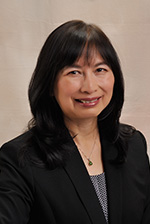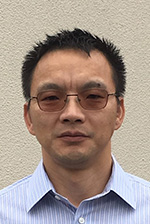Investigators
Barbara Konkle, MD
Associate Chief Scientific Officer, Associate Director
Washington Center for Bleeding Disorders and Director of the Hemostasis, Platelet Immunology and Genomics Laboratory at Bloodworks Northwest
Professor of Medicine, Division of Hematology
University of Washington
Dr. Konkle’s research and clinical activity is focused primarily on inherited bleeding disorders, including hemophilia. She has led multi-center clinical trials in hemophilia, including in patients with inhibitors. Recently she leads the MyLIfeOurFuture hemophilia project, which resulted in genetic analysis of F8 and F9 in 11,000 patients, genetic carriers or potential carriers. MLOF has established a repository of samples and phenotypic data and is a cohort in the NHLBI Transomics in Precision Medicine (TOPMed) initiative. In the U54, she will coordinate patient sample and clinical data collection for the assays/analysis and provide clinical insight into experimental design and in interpretation of results.

Carol H. Miao, PhD
Professor of Pediatrics
University of Washington
Seattle Children's Research Institute
carol.miao@seattlechildrens.org
Dr. Miao’s research focuses on the development of better treatment for hemophilia patients and gene therapy strategies for treating genetic diseases. Her study was the first to use non-viral naked DNA delivery to achieve phenotypic correction in hemophilia A and B mouse models. Dr. Miao has been awarded funding support by National Institutes of Health, National Hemophilia Foundation, American Heart Association, Bayer Hemophilia Foundation and others. Currently her group is pursuing the following major research programs: development of safe and more efficient gene therapy approaches suitable for clinical applications including nonviral ultrasound-mediated gene delivery and direct bone marrow transduction using lentiviral gene transfer methods; development of immunomodulation strategies involving immunosuppressive regimens and adoptive regulatory T cell therapy for treating inhibitory antibodies following gene or protein replacement therapy; and study of the signature and impact of glycosylation on inducing anti-factor VIII immune responses. Dr. Miao is active in many regional, national and international scientific societies; she is on the editorial board of Molecular Therapy and other scientific Journals and serves on NIH study sections and other review duties.

George Wang, PhD
Professor, Department of Chemistry, Georgia State University (GSU)
Georgia Research Alliance (GRA) Eminent Scholar
An endowed chair professor in carbohydrate chemistry and glycobiology
Dr. Wang has a broad background in Glycobiology, Glycochemistry and Glycoanalysis, with specific training and expertise in chemical and chemoenzymatic synthesis complex glycans and glycoconjugates. The main research focus in his group is in glycoscience: the investigation of carbohydrates in chemical, biological, agricultural, and bioengineering sciences. His current research focuses on: Developing facile and efficient chemical & chemoenzymatic strategies for rapid access of complex glycans and glycoconjugates and applying these glycans to study protein-glycan interactions via glycan microarray, biosynthesis and biogenesis of bacterial polysaccharide (PS) and development of bacterial PS based vaccines, chemical Biology and Medicinal Chemistry, and mass spectrometry-based glycomics and glycoproteomics.

Weidong Xiao, PhD
Professor, Microbiology and Immunology
Professor, Sol Sherry Thrombosis Research Center
Professor, Cardiovascular Research Center
Professor, Center for Metabolic Disease Research
Temple University
Dr. Xiao is a Professor in the Department of Microbiology & Immunology at Lewis Katz School of Medicine - Temple University. Dr. Xiao’s research program focuses on gene therapy of hemophilia A using AAV vectors. He developed the first AAV capsid with tissue-tropism for human gene therapy which was the first AAV to be approved as a drug. Dr. Xiao has long-standing research interests in understanding AAV basic biology, vector development and optimization, factor VIII biology, and hemophilia A gene therapy using AAV vectors. His projects in the U54 program will focus on the mechanism of factor VIII glycosylation which impacts factor VIII inhibitor development.
